|
Words by Dr. Marta Collu Edited by Dr. Laurie Herviou, Dr. Conchi Izquierdo and Dr. Lucie Yammine As scientists, we apply project management principles every day, from planning and leading research activities, to effectively engaging and communicating with people. Yet, Project Management is a discipline on its own, and many scientists have chosen to transition from a bench research position to a management role. You are probably a scientist at the stage of exploring alternative career paths, looking for networking opportunities and to know more about what being a scientific project manager actually is. To help you with it, INet-NYC hosted a virtual career development event on February 23rd, 2021, dedicated to Scientific Program and Project Management. Flyer of the event by Matthew Baffuto The event, featuring four experts in the field, aimed to discuss how to sail to a project management career in a relaxed, conversational atmosphere. INet-NYC board members, Dr. Marta Collu, Dr. Rinki Saha and Dr. Zafar Mahmood were the organizers and moderators of this event.
To start, the panelists were invited to give a brief introduction about themselves, describing their background and current role. All trained as scientists and earned a Life Science PhD degree, they transitioned to a project management role, and currently work for institutions spanning academia, private companies, governmental and non-profit organizations. Dr. Linda Molla works as Senior Project Associate at Regeneron Pharmaceuticals; Dr. Stephanie Morris is Program Director at the National Institutes of Health (NIH) in the National Human Genome Research Institute’s (NHGRI) Extramural Research Program; Dr. Shayla Shorter manages the scientific review of the Lupus Research Alliance research grants; and Dr. Federica Valsecchi is the Immunotherapy Project Manager of the Technology and Development Office (TDO) at Memorial Sloan Kettering Cancer Center (MSKCC). The diversity of the organizations our speakers work for immediately gave us a grasp of how versatile the scientific program and project management fields can be. Next, we discussed what are the most critical skills a scientific project manager should possess. “A big part of this role has to do with knowing the science, building relationships with the people, ‘connecting the dots’ and providing your support and your knowledge to the different scientific teams”.-Dr. Linda Molla As project managers constantly interact with scientists and experts, the scientific mindset surely gives the advantage of understanding the rationale behind the different project phases, and of being able to see the bigger picture. But a project management role also involves much more than science skills. For instance, communication and interpersonal skills are key: project managers engage and communicate on a daily basis with a very diverse audience, from the chief of a company, to the members of a team, or the families of a patient. Therefore, they learn how to distil very complex concepts to a level that is understandable to the targeted audience, as well as how to build strong relationships and trust among people. Dr. Federica Valsecchi added that versatility, organization, and ability to learn are also part of the core skills of a successful project manager. If all the highlighted skills do not sound familiar to you, think about your research. “You take all the skills you acquired throughout your PhD and/or postdoc experience and you just use them in really versatile ways. You all have acquired so many skills in terms of communication, multitasking and troubleshooting, and those can be applied in so many ways”. -Dr. Shayla Sorter Through defining specific aims, creating a research plan, troubleshooting, coordinating with collaborators, and presenting your work you learned how to manage projects! All the panelists highlighted that throughout our graduate school and/or postdoc experiences, we have acquired many more abilities than we think, and it is just a matter of understanding how to translate and put them in practice in a management role. Depending on what your interests are, the growth possibilities and career advancements in the field are blooming. As a great example, Dr. Stephanie Morris is now program director of an NIH division. She also explained that colleagues seeking an alternative path outside NIH, often transition to a research director role at academic institutions. Dr. Federica Valsecchi added that as a project manager of the TDO you often engage with outside entrepreneurs, investors, and industry partners, and you may become interested in transitioning into business development. Many more interesting points were touched upon during the event, and you can watch the full discussion here. By sharing their experience and advice, our panelists showed us how this job represents a fulfilling career choice for STEM PhDs who are interested in pursuing a non academic career and still love to be engaged with science. During a conversation with Dr. Linda Molla a few months ago I was captivated by her depiction of the role of a project manager: the one on the backstage rather than on the frontline, leading people, giving support and making things happen. If this is what drives you, start exploring this path!
0 Comments
Dr Ariola Bardhi is originally from Albania. She moved to the US 12 years ago to pursue a college degree. She got interested in biomedical research and decided to attend graduate school in New York City. Her research focused on engineered immunotherapy for HIV treatment. During her PhD, Dr Bardhi co-founded INet-NYC in order to bring together and offer career opportunities to international scientists in New York City. She then got interested in careers beyond the bench and drug development process. She worked as a consultant for 2 years before she transitioned to a career in Medical Communication. She is currently a senior medical writer at BGB Group. 'You need to be truthful with yourself, understand what is important to you and then find avenues on how to make it work' 'Everybody is different. As long as you know what works for you, you are set up for success.' 'Be more open about the opportunities and enjoy the process instead of stressing out and focusing on what you are achieving.' Please, tell us a little bit about yourself: 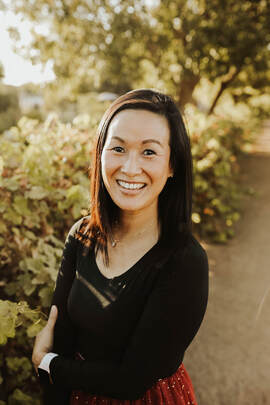 My CV tells a nice story about a girl who graduated with a Molecular and Cellular Biology degree from the University of Arizona, and moved to NYC to pursue her dreams of a PhD in Neuroscience. However, as Wei Ji Ma’s Growing up in Science series can attest- things on paper are rarely what they are in actuality. My real story is of a girl who had dreams of going to medical school, but lacked the credentials to do so straight out of college. I had a few key people take a chance on me, and with their help, I got into New York University’s Neural Science PhD program, where I ended up working in Dr. Eric Klann’s lab with an Italian postdoc who taught me everything she knew about neuroscience and to be honest, life. One constant of my education, was my interest in teaching, likely because of some of my own struggles as a student. As a result, I took it upon myself to seek teaching opportunities during my PhD and postdoctoral fellowship. From this, I was teaching assistant at NYU, and an adjunct assistant professor at Hunter College. I am certain this teaching experience is what helped me earn the position I am currently in, which is an Assistant Professor of Biochemistry and Molecular Genetics at Midwestern University. At Midwestern, I am involved with the delivery of team-taught Biochemistry courses to healthcare professional students, and I run a small laboratory studying the effects of stress on memory and neuroenergetics. I am also married to a fertility specialist, and we live in Arizona with our two children (3 & 1) and our mini-golden doodle. 'For me, work-life balance means setting boundaries [...] and also not comparing myself to other people.' In your opinion, what is the best way to maintain work-life balance? Right now, a healthy balance for me means being able to spend quality time with my young children, while also finding time for myself and my husband. Whereas, 10 years ago, it meant making time for happy hour, exercise, dating, and learning more about myself. Needless to say, “life” has carried many different meanings for me since I started my PhD in 2010. Because women panels these days focus a lot on how to balance marriage and children, I would like to emphasize that no matter what “life” looks for you, a healthy work-life balance is so important. It was equally important to me to find a healthy balance as a single woman in NYC as it is now as a wife and mom. For me, this means setting boundaries. Acknowledging that I have to balance feeling burned out one week and underproductive another. Working at the same speed for me, all the time, is untenable, so I accept that my productivity will ebb and flow while keeping my goals in sight. A healthy work-life balance for me also means not comparing myself to other people. One thing my dad taught me is that someone will always have more than you, and someone will always have less than you. In science this is especially true and comparing my successes and failures to someone else’s is a breeding ground for arrogance and resentment. 'The dialogue has to change where women can make decisions that best suit their lives, without any judgements regarding which societal stereotype that woman is fitting into or breaking- especially since this seems to be the case with men.' What are your thoughts on the pressure that women face in having to make a choice between having children and progressing their career? Too often, people assume all women want to get married and have children. Now, it is not uncommon to find women who have no plans for either OR have plans for one without the other. I think more broadly stated, women are judged for picking their passions and pursuing them full throttle. First, the dialogue has to change where women can make decisions that best suit their lives, without any judgements regarding which societal stereotype that woman is fitting into or breaking- especially since this seems to be the case with men. If we are successful in accomplishing this, I hope that a woman can make the decision to have kids and how it will impact her career will be a non-issue. At the end of the day, career expectations should be the same for a woman regardless of whether she is married, or has children, which relates to my opinion about work/life balance. I truly hope that people do not expect less of me because I have children, and I certainly do not expect more of my female colleagues who do not have children. In this regard, I hope that a woman will feel safe to make decisions regarding her personal life and not feel that it will affect her career whatsoever. I also recognize that I come from a privileged background where I have a supportive partner, the ability to afford childcare easily and a lot of family nearby. The absence of any one of these things would make parenting more challenging, and is a reminder of the amount of support a woman has to be in possession of in order to comfortably have children. 'The PhD and postdoc life can be lonely. [...] One of the secrets to success in this field, is feeling supported, even if it means finding the support on your own.' What advice would you give yourself if you were starting your career today? What would you say to encourage other women to persevere in their career path? If I could offer a piece of wisdom to another woman in STEM it would be this: The PhD and postdoc life can be lonely. Nobody else in the world is studying exactly what you are studying and doing it exactly the way that you are doing it. BUT, women are unified in our experiences, struggles, and wins. Make it a point find people, especially women who seemingly have everything you're working towards, and talk to her. If it’s an assistant professorship plus having children, talk to her! If it’s a K99/R00 in a high-powered lab, talk to her! If it’s a thriving lab at a PUI, talk.to.her!! Chances are, she experienced similar struggles as you, and can share what she did to overcome her challenges. One of the secrets to success in this field, is feeling supported, even if it means finding the support on your own.
If I could give my former self advice, it would be that progress is progress. Many of my proudest accomplishments are the ones that don’t come in the form of an acceptance, degree or certificate, but it was hard to see or appreciate at the time. Moreover, getting a PhD and pursuing a postdoc can feel strange during our mid 20-30s when friends are already advancing in their careers after graduating college. It gives the illusion that we are in stasis, but that couldn’t be farther from the truth. After all, it is a real job to work as a PhD or a postdoc, even though you’re pursuing a degree and potentially earning less than your friends. Ok, I might also reassure myself that yes, I can eventually raise two children, finish my PhD and teach medical students about the Kreb’s cycle. Please, tell us a little bit about yourself:
'Implementing changes to reward good leadership and provide constructive feedback to address ineffective management practices would overall create healthier academic lab environments and help retain women in science.' What do you think the roadblocks are to representation of women in science? How can we improve women’s visibility in science? I think better visibility and representation of women in science can be achieved by creating an environment that retains women that are interested in a science career. The current academic system does a great job at rewarding individual successes of leaders of labs as measured by number of high impact scientific papers published and number of grants rewarded, but I think that is not enough. Rewarding leaders for how they manage and help employees or trainees to develop to achieve their goals (within or outside an academic science) should also be rewarded and factored in tenure and promotion decisions. Deeper structural changes are needed within academia to incorporate 360-degree feedback to help develop leaders. Implementing changes to reward good leadership and provide constructive feedback to address ineffective management practices would overall create healthier academic lab environments and help retain women in science. 'If we want to impact change, each and every one of us needs to speak up in our workplaces.' What are your thoughts on the pressure that women face in having to make a choice between starting a family and progressing their career? In today’s world many scientists relocate away from families to continue their careers and this can make it challenging to grow a family while at the same time investing in one’s career. I am in favor of workplace changes to help women and men better balance career and family. Changes I am in favor of are providing affordable daycare centers for all families (no matter the income brackets), implementing paternity and maternity leave, allowing for flexible work hours and ability to work remotely when needed. If we want to impact change, each and every one of us needs to speak up in our workplaces. In the USA, additional layers of complexity are faced by immigrant scientists who are vulnerable to illogical and convoluted immigration policies. USA is very welcoming of foreign science talent but does not provide a proper timely path to permanent residency for those who want to stay in the USA to build their scientific careers and grow their families. Such unfriendly immigration policies not openly communicated by recruiting universities or companies add huge uncertainty on women’s career progression and their families. 'Build genuine relationships with others.' What advice would you give yourself if you were starting your career today? What would you say to encourage other women to persevere in their career path? Build genuine relationships with others. Invest time in surrounding yourself with a strong support system with many mentors and friends that can provide advice or be a sounding board during key decisions. Be involved with your community where you live, work, or study and try to support and constructively give back. Always pay it forward.
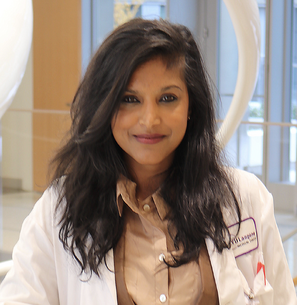 Tell us a little bit about yourself I am an Assistant Professor of Surgery and Cell Biology at New York University Langone Medical Center. I direct, mentor, train a team of diverse scientists to address specific questions regarding diseases affecting the vasculature such as aortic aneurysms. I am one of few women of minority background to hold such a position in a clinical department. You can read more about my research program and interest here: ncomms-10yr-ecr-ramkhelawon/ I won numerous awards including Académie de Médecine excellence thesis prize, UNESCO/L’OREAL women in science international rising talent award, the American Heart Association early career investigator award and recently the French-American Foundation Young Leaders award. I also participated in several events advocating for women in science. 'Women, as men should not have to MAKE the choice to focus on climbing their career ladder or decide to start a family (...) There is still a long road to ride.' What are your thoughts on the pressure that women face in having to make a choice between starting a family and progressing their career? Women, as men should not have to MAKE the choice to focus on climbing their career ladder or decide to start a family. Women, as men, should be able to do BOTH. Constraint of age, put unnecessary time pressure on women to conceive- this is unfortunately the biological effects of aging on the female body. Can we fix this? I think so. Science and technology has made so much progress that women can benefit from. Let’s imagine a scenario- all women in their twenties are offered the opportunity to freeze their eggs. Make a pause on aging through technology. Relieve the stress. Move on with their career. Decide to use the conserved eggs when they are ready OR if they would like to later on. Actually, whether to have children is the choice women should MAKE unpressured by time, social eye and biological differences between male and female anatomy. The reproductive system of women is very complex and understudied. Men and Women are biologically different. But alas, many of social, economical and medical decisions are still based solely on men neglecting female attributes. For example, for more than two decades now, there is an oral treatment for erectile dysfunction but we still don’t understand what is and how to treat endometriosis. It is not a fight between men and women-it is simply called - GENDER EQUALITY. There is still a long road to ride. I think we will probably reach equality between gender in science when we will start asking man the same question about family and career. What are the things that keep you motivated in your everyday life? Do you have any daily ritual that helps you stay consistently motivated and balanced? Being a scientist comes with its own trail of stress and challenges. But there are some unique moments that nourish my drive as a scientist. Those Einstein moments-at a microscale level. Where you get to perform an experiment to address a question-and it works. Feels fantastic. Feels like the first bite of ice cream on a hot summer day. But next minute you are thinking about the next question. I have similar passion about many unknowns and unexplained events in our everyday lives. My head is full of questions and I love to experiment. I am excited about new and many adventures in life. Managing, directing and mentoring the next generation of scientists cultivates my motivation. Developing ideas in a diverse and inclusive team sustains my enthusiasm. Promoting women and underrepresented communities in science is very gratifying. 'Promoting women and underrepresented communities in science is very gratifying.' What advice would you give yourself if you were starting your career today? What would you say to encourage other women to persevere in their career path? The same things I did a couple of years ago. Be strong, bold, brave, passionate, hard working, smart, learn the best from the best- be THE woman. Never let someone else tell you who you are. Learn to know and define yourself-all of yourself-from brain to feet. The fastest route is not always the straight one. Identify your strength and use it to push yourself forward and fight your weaknesses. More advice from junior investigators here: https://www.navbo.org/resources/lessons-learned 'Never let someone else tell you who you are. Learn to know and define yourself-all of yourself-from brain to feet. The fastest route is not always the straight one.' 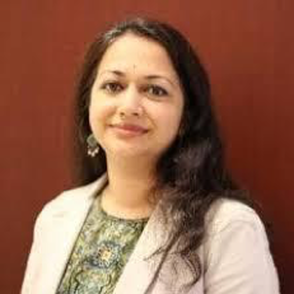 Tell us a little bit about yourself I am a scientist by training. I’m a Buckeye having received my PhD in Microbiology from the Ohio State University. I was part of the team that discovered the 22ndamino acid, Pyrrolysine. After my PhD I went on to pursue a post-doctoral fellowship at MIT. My research focused on fundamental science and understanding of protein synthesis mechanisms in Archaea. My career began as a scientist followed by technology licensing and business development at MIT and the Boston area. I later moved to Atlanta and joined Emory in 2014 as the industry partnership liaison for the Woodruff Health Sciences Center. In 2019 I became the Executive Director of the Office of Corporate Relations for the university. My role at Emory is to provide a “front door” for industry to connect with the right resources within Emory in order to further their objectives and support Emory’s research, education, and healthcare mission. collaborate with teams within and outside of Emory to determine synergies where partnerships can be initiated or expanded in order to solve real world problems and advance innovation. I am also a trained Indian classical dancer and singer. In my spare time, I continue to teach both artforms. 'Women have always needed to go more than the extra mile to rise above the background.' What do you think the roadblocks are to representation of women in science? How can we improve women’s visibility in science? I feel the roadblocks for women are that the biological clock and the tenure clock or climbing the corporate ladder are exactly at the same time. This makes for hard choices for a career in science for women. Women can shine in roles early in their careers if they have support with child care at home. Women have to take a hard look at the opportunities in front of them and make the right decision for their circumstances. There are relatively fewer women in leadership positions to serve as role models and that is yet another issue. Women have always needed to go more than the extra mile to rise above the background. I think men and women in the community need to understand this issue for the sake of their wives, sisters, mothers, and daughters. They need to mentor, advise, and nominate women they know to leadership positions. I feel saddened that even in this day and age we still need to be talking about unconscious biases and the inequities between men and women. We will all have to come together as a society to improve women’s visibility in science. Encouraging education in S.T.E.M.is a key first step. I feel that the government and employers need to take appropriate steps to help remove obstacles in the path towards success for women in science. Government should also put in place inducements during elementary and middle school education for girls to explore the world of science. 'We all have to come together as a society to improve women’s visibility in science' What are your thoughts on the pressure that women face in having to make a choice between starting a family and progressing their career? The pressures that women face in having to make a choice between starting a family and progressing their career is immense. When women choose to start a family while working full time, they have to take a break from their careers to care for their young children. This coincides with the stage in their careers when they need to be giving 150% of effort to climb up the ladder. This dichotomy is one of the critical reasons for women lagging behind in careers since they are usually the primary caregivers for the young ones in their family. I always remember the saying “it takes a village to raise a child” and that is absolutely true for women and their careers. Society in the U.S. is designed for women to take a back seat with their careers when raising children. It starts with daycare costs and then to how k-12 operates. All school events occur during the work hours and as a working woman it is hard to make the choice of attending the events or not. As children grow older it gets better but there needs to be a support system that is lacking here to support women in S.T.E.M. Most of the S.T.E.M. careers require women to be physically at work and that adds to the burden. Careers in computer science, informatics, and public health, epidemiology are areas of S.T.E.M. where physical presence at work is not critical. Careers in these areas of science may be worth exploring for young women. 'The pressures that women face in having to make a choice between starting a family and progressing their career is immense.' What advice would you give yourself if you were starting your career today? What would you say to encourage other women to persevere in their career path? I am very passionate about science and research. I still get goosebumps when I read research papers that show breakthroughs in science and wonder what life as a scientist could have been for me. I would tell my younger self other than enjoy the work that you do, take initiative and make changes to your career path at appropriate times, especially when you know you have outgrown a role. Be adventurous and explore new opportunities as they arise (or create new paths). 'Be adventurous and explore new opportunities as they arise (or create new paths).' 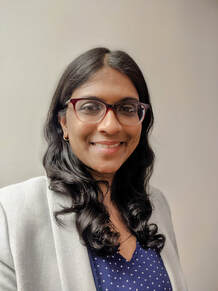 Tell us a little bit about yourself I’m currently a Biochemist at Chemeleon, a small biotech start-up in Brooklyn that is building rapid, easy-to-use colorimetric sensors for disease biomarkers and drugs of abuse. I moved to the US from India to get a degree in Biochemistry at Denison University, followed by a PhD in Microbiology at the University of Texas at Austin. I am passionate about protein and RNA folding as well as understanding how cellular organelles maintain their function under stress, which I was lucky to pursue during my time as a postdoc at Memorial Sloan Kettering Cancer Center. Over my academic career, I’ve had the opportunity to work in several fields ranging from structural and RNA biology to cancer biology and now really enjoy combining this expertise towards the development of biosensors. What do you think the roadblocks are to representation of women in science? How can we improve women’s visibility in science? Growing up I assumed most scientific discoveries were done by men and learnt very little about the contributions of women to different scientific disciplines. Bringing these contributions to light in classrooms to highlight that women researchers were also making critical discoveries all through history and discussing the unique challenges they faced would be of great value. Having more young women scientists engaging with students in classrooms and answering important questions posed by the media is also important to help fight the current stereotype of the scientist. 'Highlight that women researchers were also making critical discoveries all through history and discussing the unique challenges they faced would be of great value.' In your opinion, what is the best way to maintain work-life balance? It’s important to be clear what your priorities are in both your career and personal life and dedicate your time accordingly. These priorities can change often, especially in a start-up, so I often reevaluate based on the needs of the coming weeks and make sure the goals are manageable. It’s also okay to say no sometimes and be clear about what can be reasonably accomplished within a certain time frame in order to manage expectations. 'It’s also okay to say no sometimes and be clear about what can be reasonably accomplished' What advice would you give yourself if you were starting your career today? What would you say to encourage other women to persevere in their career path? Reach out and join communities around you that share common interests, whether it’s science policy, STEM outreach, activism or entrepreneurship groups. It will help give you insight into how you enjoy engaging in science both in your career and personal life as well as provide you with a strong supportive network of mentors. 'Reach out and join communities around you that share common interests (...) It will help give you insight into how you enjoy engaging in science' 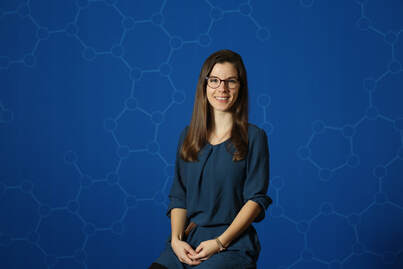 Tell us a little bit about yourself I moved to Long Island in 2019 to start my own research lab as a Fellow at Cold Spring Harbor Laboratory. We study how the immune system distinguishes between self and non-self to effectively fight infection and prevent autoimmune diseases. I originally trained in molecular biotechnology with a wet-lab focus on synthetic biology and immunology. For my PhD I switched to computational biology, ‘picking up’ math and statistics on the way, to develop models for analyzing high-dimensional phenotype data and association analysis of human cardiac morphology data. Cold Spring Harbor Laboratory hired me as Fellow directly after my PhD. This faculty position uniquely allows me to bring together my long-standing interest in immunology with my skills in high-dimensional data analyses and statistical methods in my own independent research group. We develop new experimental and computational approaches to understand how gene expression heterogeneity is regulated during T cell development in the thymus. What do you think the roadblocks are to representation of women in science? How can we improve women’s visibility in science? Many of the issues on representation of women in science have been discussed for many years, long before I became a scientist myself. It seems like the issues are known, but discussions often stay theoretical without practical impact. Worse even, the burden of trying to make a change is often placed on the minority group, here women – this takes away from time that can be spent on research or other ‘productive’ efforts, putting women in a further disadvantage. We need male allies on all levels, direct peer to peer support and, importantly, allies in leadership positions. We need leaders to fully acknowledge the issues of underrepresentation and obstacles and need their full commitment to bring about practical change. This includes not only transparent recruitment efforts but also creating and establishing supportive work environments and equitable opportunities. In your opinion, what is the best way to maintain work-life balance? Work-life balance means different things for different people. So first, find out what it means for yourself and determine your priorities – not what you think other people expect. How flexible do you want to be and how flexible can you be with your responsibilities at home and at work? I found these answers for myself and use them to establish boundaries. This includes prioritizing projects, learning (still in the progress) to say ‘no’, and learning (also still in progress) not to feel guilty when I cannot stick to my own rules. What are the things that keep you motivated in your everyday life? Do you have any daily ritual that helps you stay consistently motivated and balanced? I do not have a daily ritual per se – I try not to set too many additional ‘must do’s’ that I feel bad about when I don’t manage to do them. In the past half a year, I’ve enjoyed daily online yoga classes. Depending on the intensity level, it’s either a great exercise session or meditative. As I do it first thing in the morning, it is a great way to start the day before work. What advice would you give yourself if you were starting your career today? What would you say to encourage other women to persevere in their career path? Trust your instincts, have confidence in your own abilities, don’t compare yourself to others! The latter has been a crucial learning point for me and is something that I still have to tell myself on a regular basis. The further you get in your career, the less constant feedback you’ll receive. Find peers and colleagues in similar positions to share the good and bad and form peer-to-peer mentorship. 'Trust your instincts, have confidence in your own abilities, don’t compare yourself to others! ' 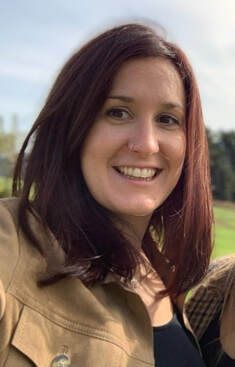 Tell us a little bit about yourself I was born in San Sebastian, a beautiful small city in the north of Spain, where I also studied Biomedical Engineering. After that, I moved to other cities around Spain to study a Master in Bioinformatics and finally I earned my PhD in Pharmacometrics in the University of Navarra. During my PhD I had the opportunity to do an intership in the Dana-Farber Cancer Institute in Boston and that was my first time in the states. I really liked the experience so I moved to New York to do a postdoc in the Icanh School of Medicine at Mount Sinai. After a year, I decided that I wanted to change academia to industry and now I´m working in AstraZeneca in Cambridge (UK) as a Clinical Pharmacometrician, where I use mathematical modeling and statistics to describe and predict drug response in patients, allowing the optimization of clinical trial designs. What advice would you give yourself if you were starting your career today? What would you say to encourage other women to persevere in their career path? Don´t be afraid of doing the wrong choice, making mistakes is part of the path, but correcting them is your responsibility. What would you say to encourage other women to persevere in their career path? The best advice for women and men to persevere in their career path is to enjoy what they do and don´t seek other’s approval to do what they like and make them happy. I don´t think that women need a different advice than men, if that happens means that the career path for women and men is different and it shouldn´t be different. Did you ever feel treated unfairly at work because of your gender and how did you deal with that? No, I did not. However, if I ever experience such a thing, I know that I will not accept that situation. I will encourage women that are treated unfairly not to be silent because then they are normalizing a situation that is far from normal. People that behave in such a way should never have the comfort of our silence again. What are your thoughts on the pressure that women face in having to make a choice between starting a family and progressing their career? I think that in general it is difficult to start a family and progress in your career both at the same time. Sometimes you need to postpone one or the other. However, this is not a decision that women need to make, this is a decision that a couple needs to make. We need to make men understand that this is an all-gender question that they´ll need to ask themselves at some point in their lives, make them aware that probably they´ll need to sacrifice a bit their career for some time if they want to start a family, that raising children is not a women thing. 'Don´t be afraid of doing the wrong choice, making mistakes is part of the path, but correcting them is your responsibility.' Dr Jessica Andres Bergos (@Jess_A_Bergos) is currently the Director of Clinical Research and Operations at the Center for Regenerative Medicine at Hospital for Special Surgery. Jessica is originally from Spain where she did her PhD. She moved to the US 8 years ago for a postdoctoral position at Weill Cornell Medicine. She then decided to transition from the bench to a new career path, oriented toward clinical research, patient care and healthcare management. 'The first step to maintain work-life balance is wanting to maintain work life balance' 'Try to learn more cross-functional skills !' |
Archives
October 2024
Categories
All
|
© INet NYC, 2014
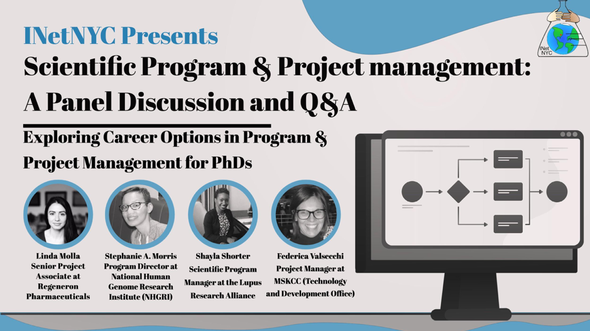

 RSS Feed
RSS Feed